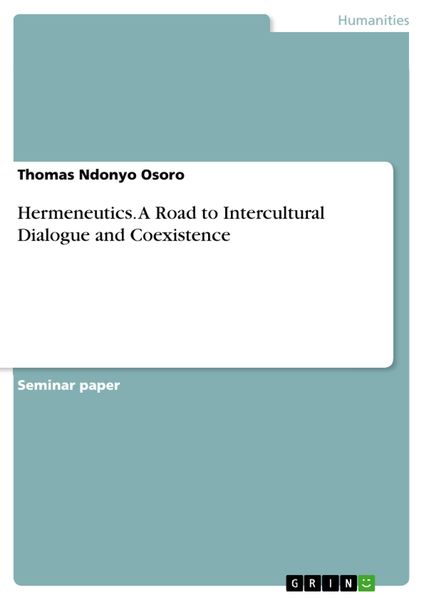Beschreibung
Seminar paper from the year 2015 in the subject Philosophy – Theoretical (Realisation, Science, Logic, Language), , language: English, abstract: Our contemporary society is marked with both positive and negative elements. On one hand, all world cultures want to develop into a contemporary world civilization heralded by the current and sophisticated information and communication technologies that have permeated through different social-cultural and political-religious realms. In this socialization process, there is the question as to if there is a proper dialogue among different cultures and cultural mindsets before accepting some cultural contents from another. In this article, I discuss three main points which have got to do with requisites for an intercultural socialization process based on the understanding of one’s own culture, the language use, and the understanding of a culture’s symbolism. It is then after a well established interpretive processes leading to self-awareness as persons in a culture that people of a given culture can open up to the others for a for and coexistence. This is a challenging issue as some culture which consider themselves as superior to others may manipulate the process or simply requires that other cultures assimilate their style of life. Nevertheless, hermeneutics as a science of interpretation serves a useful tool in dealing with inter-cultural exchange processes within the realm of the symbolic language use and the power of symbolism it shrouds. The Word hermeneutics comes from a Greek Word hermeneuein, which means to interpret (Hernandez, 2008), a task proper to human beings in order to meaningfully understand the world they inhabit. Gonzalez (1996: 146) holds the same thought when he asserts, “on the basis of experience, and on the prevention of a possible future, I make an option, take an attitude, decision or stand, which automatically go adjusting themselves according to the new experiences that I encounter in communication in which we organize our possibilities and impossibilities” (author’s translation). Hence, to interpret implies learning to live, through the raising of “Socratic questions” in pursuit of the sense of the reality that circumscribe our constant search for understanding. According to Arráez, Calles, & Tovar (2006), the word Hermeneutics is not new in the human history as it has been used since the time of Aristotle (384-382 B.C) who used it in his work Organum in which he wrote Peri hermenais as an instrument for the correct and certain thought.




